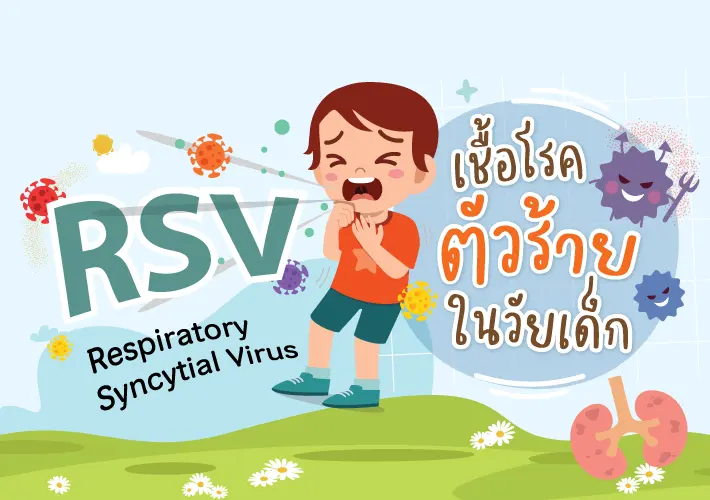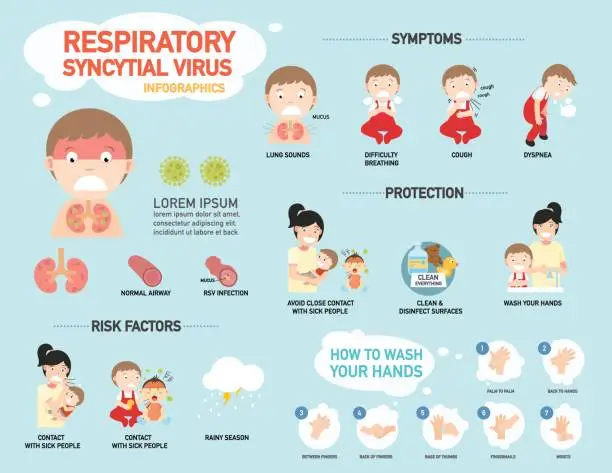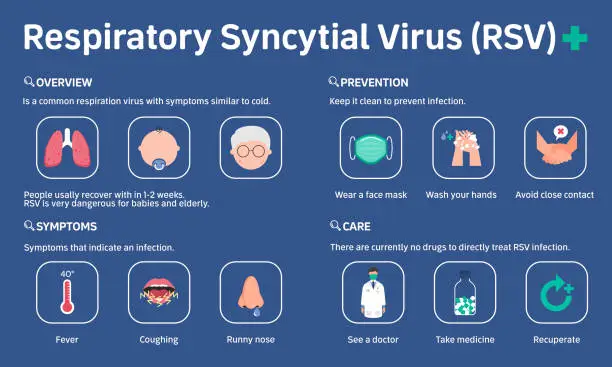
Respiratory Syncytial Virus (RSV), often referred to as the RS virus, is a common respiratory infection that primarily affects infants, young children, and older adults. Although many people may only experience mild symptoms, the RS virus can cause severe respiratory issues in vulnerable populations. In this article, we will delve into RS virus symptoms, prevention, and treatment to help you better understand and manage this condition.
What is RS Virus?
The RS virus is a highly contagious virus that infects the respiratory tract. It spreads through respiratory droplets when an infected person coughs or sneezes, as well as through direct contact with contaminated surfaces. While most healthy individuals recover from the RS virus within a week or two, it can lead to serious complications like bronchiolitis or pneumonia in high-risk groups.
Common RS Virus Symptoms

Recognizing RS virus symptoms early can help prevent complications and reduce the spread of the virus. The symptoms often mimic those of a cold or flu, which can make diagnosis challenging. Below are the most common RS virus symptoms:
- Runny Nose: One of the earliest signs of RS virus infection is a persistent runny nose. This symptom is often accompanied by nasal congestion.
- Cough: A dry or productive cough is another hallmark of RS virus symptoms. The cough can become more severe as the infection progresses.
- Fever: Mild to moderate fever is a common symptom, especially in the early stages of the RS virus.
- Wheezing: In some cases, the RS virus can cause wheezing, particularly in infants and young children.
- Difficulty Breathing: Severe cases may lead to rapid or labored breathing, which requires immediate medical attention.
- Loss of Appetite: Reduced appetite and difficulty feeding are common RS virus symptoms in infants.
- Fatigue: General fatigue and irritability are frequently reported, especially in young children.
While most cases of the RS virus resolve without complications, severe symptoms such as difficulty breathing, high fever, or dehydration should prompt immediate medical care.
How is the RS Virus Diagnosed?
Doctors typically diagnose the RS virus based on a physical examination and a review of the patient’s symptoms. In some cases, laboratory tests like a nasal swab or blood test may be used to confirm the presence of the virus. Imaging studies, such as chest X-rays, might also be recommended if severe respiratory symptoms are present.
High-Risk Groups for Severe RS Virus Symptoms

Certain groups are more vulnerable to severe RS virus symptoms, including:
- Infants and Premature Babies: Their underdeveloped immune systems make them more susceptible to complications.
- Older Adults: Aging can weaken the immune system, increasing the risk of severe infections.
- Individuals with Chronic Respiratory Conditions: Conditions like asthma or chronic obstructive pulmonary disease (COPD) heighten vulnerability.
- Immunocompromised Individuals: Those with weakened immune systems, due to conditions like HIV or chemotherapy, are at higher risk.
Preventing the RS Virus
Preventing the RS virus is especially important for high-risk groups. Here are some effective prevention strategies:
- Practice Good Hygiene: Wash your hands frequently with soap and water for at least 20 seconds.
- Avoid Close Contact: Keep a safe distance from individuals showing RS virus symptoms or other signs of illness.
- Clean and Disinfect Surfaces: Regularly disinfect commonly touched surfaces like doorknobs, toys, and countertops.
- Use a Tissue or Elbow: When coughing or sneezing, use a tissue or your elbow to prevent the spread of respiratory droplets.
- Limit Exposure for High-Risk Individuals: Avoid crowded places and unnecessary exposure during RSV season.
For high-risk infants, a medication called palivizumab may be prescribed to reduce the risk of severe infection. This is typically given as a monthly injection during the peak RSV season.
Treating RS Virus Symptoms
There is currently no specific antiviral treatment for the RS virus, but managing symptoms can help improve comfort and prevent complications. Here are some common approaches to treating RS virus symptoms:
- Hydration: Encourage fluid intake to prevent dehydration.
- Nasal Suction: Use a bulb syringe or saline drops to clear nasal congestion in infants.
- Humidifiers: A cool-mist humidifier can help ease breathing and soothe irritated airways.
- Fever Management: Over-the-counter medications like acetaminophen or ibuprofen can be used to reduce fever and alleviate discomfort. Always consult a healthcare provider for the correct dosage, especially for children.
- Rest: Ensure ample rest to support the body’s recovery process.
In severe cases, hospitalization may be necessary to provide oxygen therapy, intravenous fluids, or mechanical ventilation.
When to Seek Medical Attention
While most cases of the RS virus can be managed at home, certain symptoms warrant immediate medical care. These include:
- Persistent wheezing or difficulty breathing
- High fever that does not respond to medication
- Signs of dehydration, such as dry mouth, sunken eyes, or reduced urination
- Bluish color around the lips or fingernails
The RS Virus in a Post-Pandemic World
The COVID-19 pandemic has brought renewed attention to respiratory viruses like RSV. Increased awareness and preventive measures, such as wearing masks and practicing social distancing, have proven effective in reducing the spread of not only COVID-19 but also other respiratory infections, including the RS virus.
Final Thoughts
Understanding RS virus symptoms and taking proactive steps to prevent infection can make a significant difference, particularly for high-risk groups. If you or a loved one experience RS virus symptoms, monitor them closely and seek medical care when necessary. By staying informed and vigilant, we can reduce the impact of this common yet potentially serious respiratory infection.
Also visit https://en.wikipedia.org/wiki/Respiratory_syncytial_virus
Also visit https://knowledgekendra.com/gukesh/
Conclusion
The RS virus remains a significant health concern, particularly for vulnerable populations such as infants, the elderly, and those with compromised immune systems. By recognizing the symptoms early, practicing good hygiene, and seeking timely medical attention when needed, we can mitigate the risks associated with this respiratory infection. Education and awareness are key to ensuring the safety and well-being of ourselves and our loved ones in the face of this common yet serious virus.




